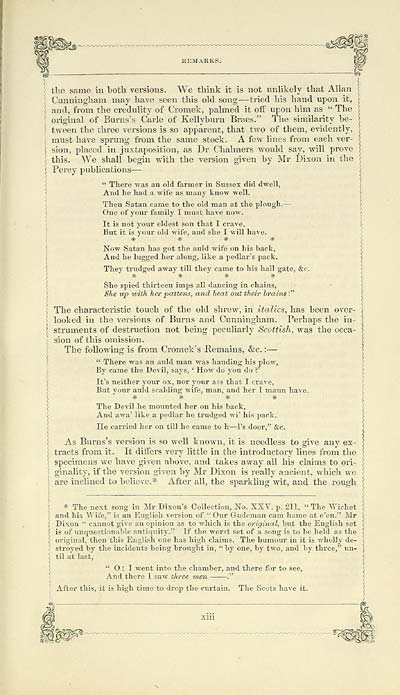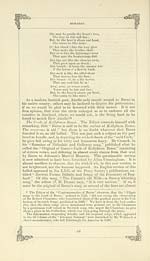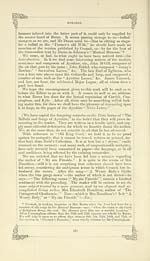Glen Collection of printed music > Printed text > Ballads and songs of Ayrshire > Volume 2
(139) Page xiii
Download files
Complete book:
Complete section:
Individual page:
Thumbnail gallery: Grid view | List view

i the same in both versions. We think it is not unhkely that Allan
;' Cunningham may have seen this old song — tried his hand upon it,
\ and, from the credulity of Cromek, palmed it oiF upon him as " The
J original of Burns's Carle of Kellj'hurn Braes." The similarity be-
\ tween the three versions is so apparent, that two of them, evidently,
\ must have sprung from the same stock. A few lines from each ver-
sion, placed in juxtaposition, as Dr Chalmers would say, will prove
this. We shall begin with the version given by Mr Dixon in the
Percy publications —
" There was an old farmer in Sussex did dwell,
And he had a wife as many know well.
Then Satan came to the old man at the plough. —
One of your family I must have now.
It is not your eldest son that I crave,
But it is your old wife, and she I will have.
* * * »
Now Satan has got the auld wife on his back,
And he lugged her along, like a pedlar's pack.
They trudged away till they came to his hall gate, &c.
» * * *
She spied thirteen imps all dancing in chains,
She up with her pattens, and beat out their brains !"
The characteristic touch of the old shrew, in italics, has been over-
looked in the versions of Burns and Cunningham. Perhaps the in-
struments of destruction not being peculiarly Scottish, was the occa-
sion of this omission.
The following is from Cromek's Remains, &c. : —
" There was an auld man was handing his plow,
By came the Devil, says, ' How do you do ?'
It's neither your ox, nor your ass that I crave,
But your auld scalding wife, man, and her I maun have.
* * * *
The Devil he mounted her on his back,
And awa' like a pedlar he trudged wi' his pack.
He carried her on till he came to h — I's door," &c.
As Burns's version is so well known, it is needless to give any ex-
tracts from it. It ditfei's very little in the introductory lines from the
specimens we have given above, and takes away all his claims to ori-
ginality, if the version given by Mr Dixon is really ancient, which we
are inclined to believe.* After all, the sparkling vrit, and the rough
* The next song in Mr Dixon's Collection, No. XXV. p. 211, " The Wichet
and his Wife," is an English version of " Our C4udeman cam hame at e'en." Mr
Dixon '• cannot give an opinion as to which is the original, but the English set
is of unquestionable antiquity." If the worst set of a song is to be held as the
original, then this English one has high claims. The humour in it is wholly de-
stroyed by the incidents being brought in, " by one, by two, and by three," un-
til at last,
"Oil went into the chamber, and there for to see.
And there I saw three men ."
After this, it is high time to drop the curtain. The Scots have it.
;' Cunningham may have seen this old song — tried his hand upon it,
\ and, from the credulity of Cromek, palmed it oiF upon him as " The
J original of Burns's Carle of Kellj'hurn Braes." The similarity be-
\ tween the three versions is so apparent, that two of them, evidently,
\ must have sprung from the same stock. A few lines from each ver-
sion, placed in juxtaposition, as Dr Chalmers would say, will prove
this. We shall begin with the version given by Mr Dixon in the
Percy publications —
" There was an old farmer in Sussex did dwell,
And he had a wife as many know well.
Then Satan came to the old man at the plough. —
One of your family I must have now.
It is not your eldest son that I crave,
But it is your old wife, and she I will have.
* * * »
Now Satan has got the auld wife on his back,
And he lugged her along, like a pedlar's pack.
They trudged away till they came to his hall gate, &c.
» * * *
She spied thirteen imps all dancing in chains,
She up with her pattens, and beat out their brains !"
The characteristic touch of the old shrew, in italics, has been over-
looked in the versions of Burns and Cunningham. Perhaps the in-
struments of destruction not being peculiarly Scottish, was the occa-
sion of this omission.
The following is from Cromek's Remains, &c. : —
" There was an auld man was handing his plow,
By came the Devil, says, ' How do you do ?'
It's neither your ox, nor your ass that I crave,
But your auld scalding wife, man, and her I maun have.
* * * *
The Devil he mounted her on his back,
And awa' like a pedlar he trudged wi' his pack.
He carried her on till he came to h — I's door," &c.
As Burns's version is so well known, it is needless to give any ex-
tracts from it. It ditfei's very little in the introductory lines from the
specimens we have given above, and takes away all his claims to ori-
ginality, if the version given by Mr Dixon is really ancient, which we
are inclined to believe.* After all, the sparkling vrit, and the rough
* The next song in Mr Dixon's Collection, No. XXV. p. 211, " The Wichet
and his Wife," is an English version of " Our C4udeman cam hame at e'en." Mr
Dixon '• cannot give an opinion as to which is the original, but the English set
is of unquestionable antiquity." If the worst set of a song is to be held as the
original, then this English one has high claims. The humour in it is wholly de-
stroyed by the incidents being brought in, " by one, by two, and by three," un-
til at last,
"Oil went into the chamber, and there for to see.
And there I saw three men ."
After this, it is high time to drop the curtain. The Scots have it.
Set display mode to: Large image | Transcription
Images and transcriptions on this page, including medium image downloads, may be used under the Creative Commons Attribution 4.0 International Licence unless otherwise stated. ![]()
| Special collections of printed music > Glen Collection of printed music > Printed text > Ballads and songs of Ayrshire > Volume 2 > (139) Page xiii |
|---|
| Permanent URL | https://digital.nls.uk/91253898 |
|---|
| Shelfmark | Glen.205(2) |
|---|---|
| Additional NLS resources: | |
| Description | Illustrated with sketches, historical, traditional, narrative and biographical |
|---|---|
| Shelfmark | Glen.205(1-2) |
| Additional NLS resources: | |
| Attribution and copyright: |
|
| Description | Scottish songs and music of the 18th and early 19th centuries, including music for the Highland bagpipe. These are selected items from the collection of John Glen (1833 to 1904). Also includes a few manuscripts, some treatises, and other books on the subject. |
|---|
| Description | The Glen Collection and the Inglis Collection represent mainly 18th and 19th century Scottish music, including Scottish songs. The collections of Berlioz and Verdi collected by bibliographer Cecil Hopkinson contain contemporary and later editions of the works of the two composers Berlioz and Verdi. |
|---|

